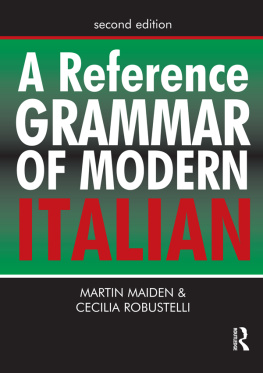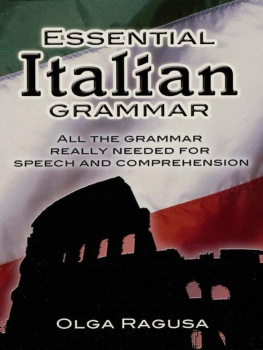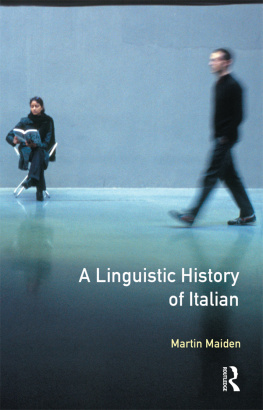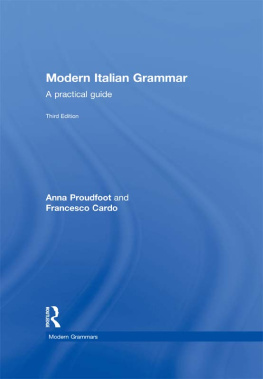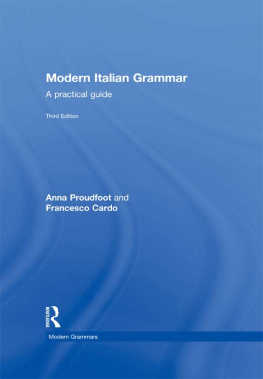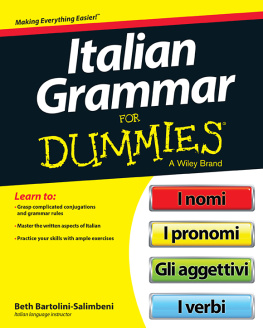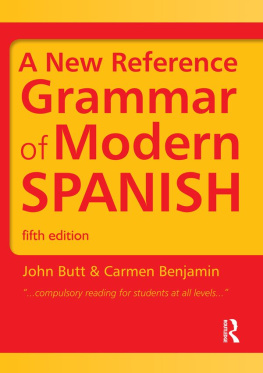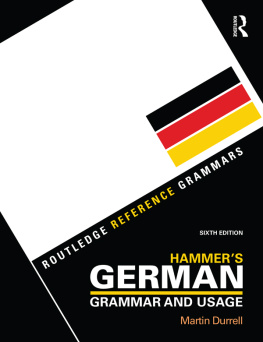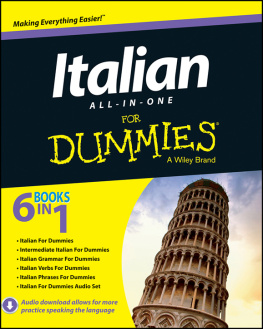Maiden Martin - A Reference Grammar of Modern Italian
Here you can read online Maiden Martin - A Reference Grammar of Modern Italian full text of the book (entire story) in english for free. Download pdf and epub, get meaning, cover and reviews about this ebook. publisher: Taylor and Francis, genre: Children. Description of the work, (preface) as well as reviews are available. Best literature library LitArk.com created for fans of good reading and offers a wide selection of genres:
Romance novel
Science fiction
Adventure
Detective
Science
History
Home and family
Prose
Art
Politics
Computer
Non-fiction
Religion
Business
Children
Humor
Choose a favorite category and find really read worthwhile books. Enjoy immersion in the world of imagination, feel the emotions of the characters or learn something new for yourself, make an fascinating discovery.
- Book:A Reference Grammar of Modern Italian
- Author:
- Publisher:Taylor and Francis
- Genre:
- Rating:5 / 5
- Favourites:Add to favourites
- Your mark:
- 100
- 1
- 2
- 3
- 4
- 5
A Reference Grammar of Modern Italian: summary, description and annotation
We offer to read an annotation, description, summary or preface (depends on what the author of the book "A Reference Grammar of Modern Italian" wrote himself). If you haven't found the necessary information about the book — write in the comments, we will try to find it.
A Reference Grammar of Modern Italian — read online for free the complete book (whole text) full work
Below is the text of the book, divided by pages. System saving the place of the last page read, allows you to conveniently read the book "A Reference Grammar of Modern Italian" online for free, without having to search again every time where you left off. Put a bookmark, and you can go to the page where you finished reading at any time.
Font size:
Interval:
Bookmark:
A Reference Grammar of Modern Italian Second Edition
A Reference Grammar of Modern Italian Second Edition
Martin Maiden
Professor of the Romance Languages, University of Oxford, UK
Cecilia Robustelli
Professor of Italian Linguistics, University of Modena and Reggio Emilia, Italy

First published 2000 by Hodder Education
Second edition published 2007 by Hodder Education
Published 2013 by Routledge
2 Park Square, Milton Park, Abingdon, Oxon OX14 4RN
711 Third Avenue, New York, NY, 10017, USA
Routledge is an imprint of the Taylor & Francis Group, an informa business
Copyright 2007 Martin Maiden and Cecilia Robustelli
All rights reserved. No part of this book may be reprinted or reproduced or utilised in any form or by any electronic, mechanical, or other means, now known or hereafter invented, including photocopying and recording, or in any information storage or retrieval system, without permission in writing from the publishers.
The advice and information in this book are believed to be true and accurate at the date of going to press, but neither the authors nor the publisher can accept any legal responsibility or liability for any errors or omissions.
British Library Cataloguing in Publication Data
A catalogue record for this book is available from the British Library
ISBN 13: 978-0-340-91339-0 (pbk)
Typeset in 10 on 12 Palatino by Phoenix Photosetting, Chatham, Kent
Most abbreviations used in this book should be transparent (masc. = masculine, fem. = feminine, sg. = singular, pl. = plural, pres. = present, etc.). Lit. is the abbreviation for literally (not literary). The symbol * placed in front of an example means that what follows is ungrammatical; in the relatively few cases where examples preceded by * are used, we have tried to be careful to make it clear in words, as well, that the relevant example is not grammatical. Sources for the examples, where given, are abbreviated as follows:
| www | = website www.alice.it (a database of contemporary Italian literature, including interviews with authors) |
| Cal. | I. Calvino 1964. Il sentiero dei nidi di ragno. Turin: Einaudi. |
| Cas. | C. Cassola 1960. La ragazza di Bube. Milan: Rizzoli. |
| Chia. | R. Chiaberge 1999. Navigatori del sapere. Milano: Raffaello Cortina. |
| Dur1. | F. Duranti 1988. Effetti personali. Milan: Rizzoli. |
| Dur2. | F. Duranti 1996. Sogni mancini. Milan: Rizzoli. |
| Esp. | L'Espresso (magazine) 8 March 1996 |
| Gal. | E. Galli della Loggia 1998. L'identit italiana. Bologna: Il Mulino. |
| Gin. | C. Ginzburg 1976. Il formaggio e i vermi. Turin: Einaudi. |
| Gua. | G. Guareschi 1948. Mondo piccolo don Camillo. Milan: Rizzoli. |
| Lam. | G. Lampedusa 1957. Il Gattopardo. Milan: Feltrinelli. |
| Mar. | D. Maraini 1990. La lunga vita di Marianna Ucra. Milan: Rizzoli. |
| Ogg. | Oggi (magazine) 13 March 1996 |
| Pan. | Panorama (magazine) 15 March 1996 |
| Rep. | La Repubblica (newspaper) 19 June 1997 |
| Rio1. | G. Riotta 1991. Cambio di stagione. Milan: Feltrinelli. |
| Rio2. | G. Riotta 1995. Ombra. Milan: Rizzoli. |
| Tu t. | Tuttosport (newspaper) 25 September 1995 |
Items given in bold in the definitions are also defined in this glossary. Where a particular term is defined in the text of this grammar, the appropriate reference is supplied.
What follows are merely working definitions of the relevant notions, as far as they are relevant to users of Italian. As an aid to using grammars in Italian, the equivalent Italian grammatical expressions are provided.
Accent (accento) The written accents of Italian are the marks (acute accent, accento acuto) and ` (grave accent, accento grave), over vowels (as well as the very rare ^ (circumflex, accento circonflesso)); for their use see . Note that Italian accento can also mean stress.
Agent (agente) An agent is the person or thing which by virtue of some activity brings about some state of affairs. Giovanni and il vento are agent subjects in Giovanni nuota Giovanni swims and Il vento ha aperto la porta The wind opened the door.
Analytic (analitico) (see )
Adjectival phrase See
Adjective (aggettivo) (see also ) A class of words whose characteristic function is to modify a noun, expressing some property of that noun. E.g., the underlined elements in la ragazza intelligente the intelligent girl, il tempo era bello the weather was nice .
Adverb (avverbio) A class of words whose characteristic function is to modify a verb or verb phrase. Often, but by no means always, ending in -mente in Italian and -ly in English. E.g., the underlined elements in canta sempre he's always singing, mangia lentamente she eats slowly . An adverb which modifies a verb phrase is sometimes called a sentence adverbial (see ): e.g., Finalmente , ti vediamo At last , we can see you.
Adversative (avversativo) An adversative conjunction is one which introduces an assertion contrary to what has already been asserted. Expressions such as but ma, however per.
Agreement (accordo) The phenomenon whereby adjectives (and also articles and demonstratives) vary in form according to the gender and number of the noun they modify, and verbs vary in form according to the person, number ) of their subject. E.g., Il gatto nero mangi a The black [male] cat eats (masculine third person singular), I gatti ner i mangi ano The black[male] cats eat (masculine third person plural), La gatta ner a mangi a The black[female] cat eats (feminine third person singular), Le gatte ner e mangi ano The black [female] cats eat (feminine third person plural). Pronouns also agree in gender and number with the noun they stand for: Viene lei = Viene la maestra.
Animate (animato) Any entity that can be perceived as acting, or being capable of acting, of its own will, is animate. Typically, human beings, but sometimes also animals.
Antecedent (antecedente) Typically, an element already mentioned to which a pronoun (and especially a relative pronoun) refers back. E.g., Vidi molte cose quel giorno, le quali non ti posso raccontare I saw many things that day, which I canot tell you about, where molte cose/many things is the antecedent of le quali/which.
Apodosis (apodosi) In a conditional construction, the apododis is the clause that expresses what will happen if the condition expressed in the protasis (protasi) is fulfilled. The protasis is the if clause, which stipulates the condition that needs to be fulfilled for something to come about. In Se viene, lo vedremo If he comes, well see him, Se viene is the protasis and
Next pageFont size:
Interval:
Bookmark:
Similar books «A Reference Grammar of Modern Italian»
Look at similar books to A Reference Grammar of Modern Italian. We have selected literature similar in name and meaning in the hope of providing readers with more options to find new, interesting, not yet read works.
Discussion, reviews of the book A Reference Grammar of Modern Italian and just readers' own opinions. Leave your comments, write what you think about the work, its meaning or the main characters. Specify what exactly you liked and what you didn't like, and why you think so.

